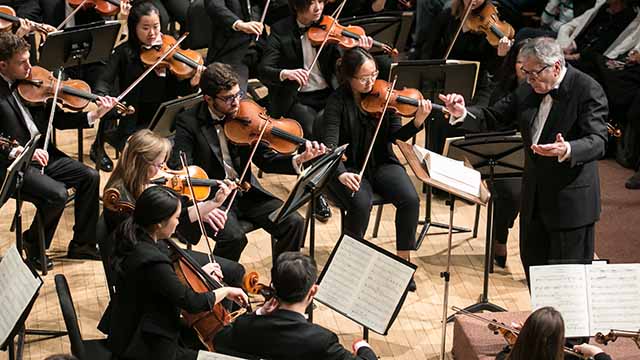EVANSTON, Ill. --- The Northwestern University Symphony Orchestra at the Henry and Leigh Bienen School of Music presents two large-scale works by Russian composers this winter: their program “Giants of Russian Music,” conducted by Victor Yampolsky, showcases Tchaikovsky’s Symphony No. 6 in B Minor (“Pathétique”) and Stravinsky’s “Le Sacre du Printemps” (“The Rite of Spring”).
The performance takes place at 7:30 p.m. Thursday, Jan. 31 in Pick-Staiger Concert Hall, located at 50 Arts Circle Drive on Northwestern’s Evanston campus.
“I have to teach all students of the orchestral department the best of orchestral music. I have to prepare all of them for professional life, and I have to highlight the entire talent of our school,” said Yampolsky, the Bienen School’s Carol F. and Arthur L. Rice University Professorship in Music Performance and director of orchestras.
Yampolsky believes the works programmed for the Jan. 31 concert represent the “absolute best of symphonic music from Russian repertoire.” The program represents a bridge between the 19th and 20th centuries, featuring era-defining music from each.
Tchaikovsky’s “Pathétique”
Completed in 1893, Tchaikvosky’s Symphony No. 6 in B Minor, also known as the “Pathétique,” was the composer’s final symphony; he conducted its premiere in St. Petersburg nine days before his death. Although the French translation of the symphony’s title incorrectly connotes a work arousing a sense of pity, the Russian title (“Pateticheskaya”) translates to “passionate” or “emotional.” Theories abound as to the themes of fate, life and death to which the symphony might allude, and speculation was further stoked by the composer’s passing so soon after its premiere. The “Pathétique” is the only one of Tchaikovsky’s symphonies to conclude in a minor key, and the somber sound of its final movement — briefly alluding to the Orthodox requiem liturgy -- surprised audiences and musicians alike. Tchaikovsky himself indicated that there was a story within the work, but did not reveal it before his death.
Stravinsky's "The Rite of Spring"
Stravinsky’s ballet “Le Sacre du Printemps” (“The Rite of Spring”) premiered during the 1913 Paris season of Sergei Diaghilev’s Ballets Russes at the Théâtre des Champs-Elysées. The subtitle of the work is “Pictures of Pagan Russia in Two Parts,” and the ballet depicts a series of primitive rites surrounding the coming of spring, after which a young maiden is chosen to dance herself to death in ritual sacrifice. Its initial reception was mixed, and legend has it that the work’s premiere incited riots, though historians note that the audience reaction at the premiere may have been somewhat more subdued than the sensational stories indicate. Although conceived for the stage, Stravinsky’s work has since received wide recognition as a concert piece and is considered among the most influential works of the 20th century. Composer Aaron Copland hailed it as “the foremost orchestral achievement of the 20th century.” Its experiments in tonality, meter, rhythm and dissonance paved the way for generations of composers to follow.
Tickets are $8 for the general public and $5 for students with a valid ID. To purchase tickets, call the Bienen School ticket office at 847-467-4000 or visit concertsatbienen.org. For more information, call the Bienen School concert office at 847-491-5441 or visit concertsatbienen.org.
About the composers:
Pyotr Ilyich Tchaikovsky (1840–1893) was the first Russian composer to receive lasting international recognition, due in large part to his conducting appearances throughout Europe and the United States. His compositions share a distinctive style displaying elements of both Western European and Russian music, a melding of both the Western-oriented teaching he received at the St. Petersburg Conservatory and the traditional Russian music that surrounded him in his youth.
Russian-born composer Igor Fyodorovich Stravinsky (1882-1971) is often considered among the most influential composers of the 20th century. His compositional output is recognized for its stylistic diversity, and for changing the way later composers approached musical form and rhythmic structure. He wrote for numerous combinations of instruments and voices, ranging from solo works to music for chamber ensembles, orchestras and operas. His 1910 ballet “The Firebird,” composed for the Ballets Russes, was an instant success, securing his reputation as a composer; it was followed by “Petrushka” in 1911 and “The Rite of Spring” in 1913.
The Bienen School is a member of the Northwestern Arts Circle, which brings together film, humanities, literary arts, music, theater, dance and visual arts.


